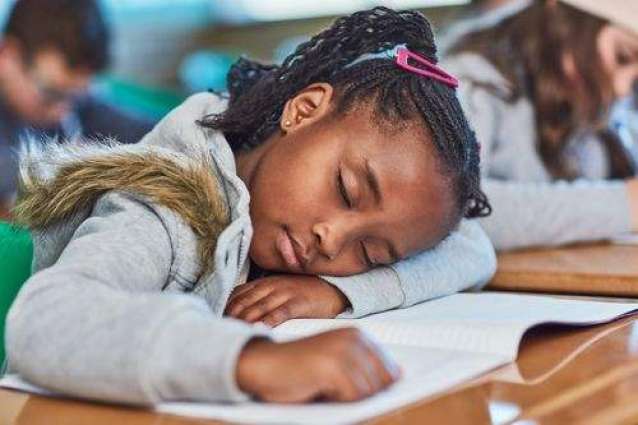Children who don't get enough sleep are more likely to not finish their homework as well as care less about their school performance
Islamabad (Pakistan Point News / Online - 07th November, 2019) Children who don't get enough sleep are more likely to not finish their homework as well as care less about their school performance. Getty ImagesEarly school start times, screen related distractions, and other external pressures have contributed to 52 percent of American children ages 6 to 17 getting less than the 9 hours per night recommended by pediatricians.The study hasn't been published yet in a peer-reviewed journal.
What researchers found was that compared to their sleep deprived peers, the 48 percent of kids who did sleep enough had a 44 percent higher likelihood of demonstrating curiosity in learning new information and skills.They were also 33 percent more likely to complete all their homework and 28 percent more likely to care about doing well in school, the researchers said.Risk factors for poor sleep include living below the Federal poverty line, lack of caregiver education on the importance of adequate sleep, increased digital media use, adverse home-life situations, and mental health issues.
The health effects of too little sleepThe dangers of not getting enough sleep go beyond mere academic performance, experts say.For one thing, lack of sleep combined with greater exposure to germs at school makes it more likely a young person will get sick."Your physical health can begin to take a beating when you skimp on the nightly rest you need," Sujay Kansagra, MD, the director of Duke University's pediatric neurology sleep medicine program in North Carolina, told Healthline.
Developmentally, a lack of sleep is also problematic."Young people, especially teens, are still developing their frontal lobe and decision making skills, but when sleep deprivation is exacerbated, your frontal lobe is most impaired," Kansagra said."This can cause mental function to be reduced similar to that of a drunk person, where decision making processes are delayed and impaired, attention is shortened, and memory functioning is decreased," he said.
The effects can be more than memory lapses, too."Sleep deprived kids have more behavioral problems, more academic problems, more health problems, more risk-taking behaviors, and more anxiety and mood related problems," Lynelle Schneeberg, PsyD, an assistant professor at Yale School of Medicine and director of the behavioral sleep program at Connecticut Children's Medical Center, told Healthline.In addition, she said, "Sleep deprived kids have more sleep terrors, nightmares, sleepwalking, and bedwetting.
"The social media problemWhile we know that screen time can disrupt kids' sleep, social media may pose unique risks because of its influence on the reward centers of the brain, Kansagra said."We live in an online world dominated by social media through which we not only consume content but can create it with a touch of a button," he said."When you are watching or creating content, your brain is secreting chemicals like norepinephrine and dopamine," Kansagra said.
"These chemicals stimulate the �wake centers' of your brain, making it harder to fall asleep."Social media also signals the adrenal glands to secrete adrenaline and the stress hormone, cortisol, when a person checks social media, says Beatrice Tauber Prior, PsyD, a clinical psychologist, author, speaker, and owner of Harborside Wellbeing in North Carolina."The last thing you want your child to experience is a surge in adrenaline and cortisol when they are trying to fall asleep," she told Healthline.
How to help kids sleep betterIf you want to help your children sleep better, start at home.Parents and caregivers play an outsized role in ensuring children and teens understand the importance of sleep and receive an appropriate amount of it, experts agree."Parents can teach their kids to fall asleep independently, can set good limits at bedtime, and can manage electronics with a house rules contract," said Schneeberg, who's also the author of the book "Become Your Child's Sleep Coach: The Bedtime Doctor's 5-Step Guide, Ages 3-10."





